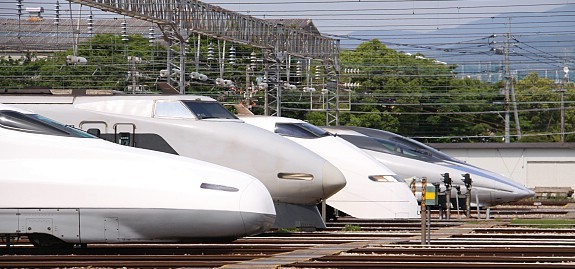1. Food
Sushi and sashimi. Need I say anymore? Yes: ramen, udon, soba, tempura, okonomiyaki, yakitori, etc. The list goes on and on as Japanese cuisine is easily the most unique and delectable in the world. People around the globe flock to this country to get a taste of Japan's renowned delicacies. Tokyo alone boasts a total of 17 Michelin 3-starred restaurants, the holy grail ranking of fine dining. To put that into perspective, the entire U.S. only has 10.
 |
| Master Jiro Ono, the best sushi chef in the world and owner of the famed Michelin 3-starred Sukiyabashi Jiro restaurant in Tokyo, completes a masterpiece tuna nigiri. |
Tokyo to Osaka (350 miles) in 2 1/2 hours. Missed your train? The next one to Osaka departs in 7 minutes. Japan invented the high-speed Shinkansen (aka Bullet Train) nearly half a century ago with a "pedestrian" speed of 130 mph, a feat that the U.S. has yet to come close to attaining even to this day. Japan Railway (JR) has since improved the Shinkansen's speed to 186 mph with plans to reach 200 mph in the near future. And no matter where you are, the JR has you covered. Add that to the most comprehensive intercity subway and bus system in the world and you get public transit that's second to none. Car ownership is so American and so unnecessary.
 |
| JR's legendary Shinkansen lineup: the most advanced high-speed train system in the world. |
Ever get sick but decide against seeing the doctor to avoid monumental wait times while paying outrageous fees? Not a problem in Japan, where 1,920 yen (~$24.40 USD) per month gets you universal healthcare with 70% coverage for nearly all visits. Getting my teeth checked and cleaned came out to a measly $15 USD and the follow-up check was an astounding $3.95. And that's after a 10-minute wait time. Dermatologist with cryogenic operation and orthopedic doctor with ankle cast molding cost a whooping $15 and $46, respectively. Japan is a good place to get sick, if you must.
 |
| Welcoming smiles aren't exclusive to the hospital. |
Smiles and warm welcomings. Japan is a service-oriented country where the customer actually comes first. It's a tradition that flows through their blood, from restaurants to hotels and airlines. Although the employees' attitudes are often superficial, their smiles and constant willingness to help end up bringing a smile to your face after a long difficult day of working in the office. If American waitresses held these kinds of attitudes, I'd be inclined to up my gratuity to 25%. Oh, and gratuities are not accepted in Japan, so the price of your selected meal is also the price out the door.
 |
| Even Hello Kitty bows for you. |
If you're 6 years old, never walk out alone at night in Japan, unless you want to go somewhere within walking distance. Because you're better off taking the convenient subway, where your ticket is half price. Japan is the only country in the world where felons willingly turn themselves in to the police. You're more likely to get stuck by lightning on a clear day than to get kidnapped on your way to school. Crime just isn't part of the Japanese culture, where the letter of the law is followed intensively. So who commits all those ultra-rare crimes? Japan likes to call them foreigners.
Conclusion
As with living in any country, there are countless pros and cons. The best way for a foreigner to live out life in Japan is to always take the bitter with the better. So before you criticize their staunch obedience to the law, remember that your 6-year-old daughter can safely walk back from school every night or take the subway for half price. And when you sink your teeth into that sashimi, all your gripes about your boss being your king outside of work seemingly fly out the door. It's a nation to be reckoned with, and in light of all their shortcomings, Japan still boasts one of the highest standards of living in the world.
"Japanese cuisine is easily the most unique and delectable in the world." That is a bold statement even for someone prone to ridiculously bold statements.
ReplyDelete